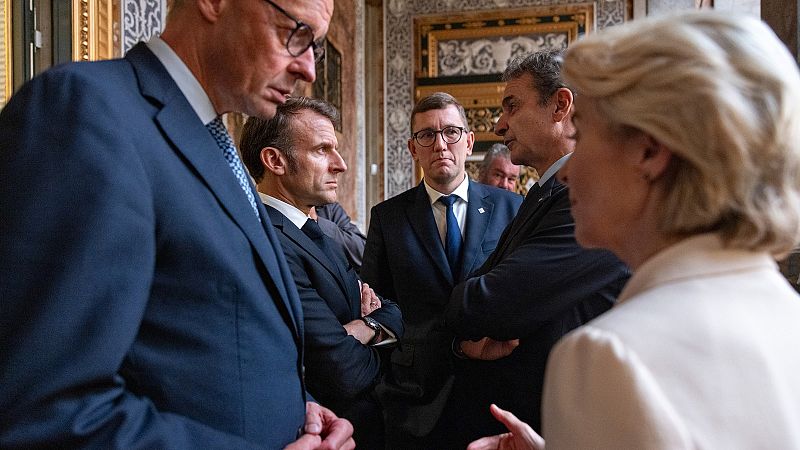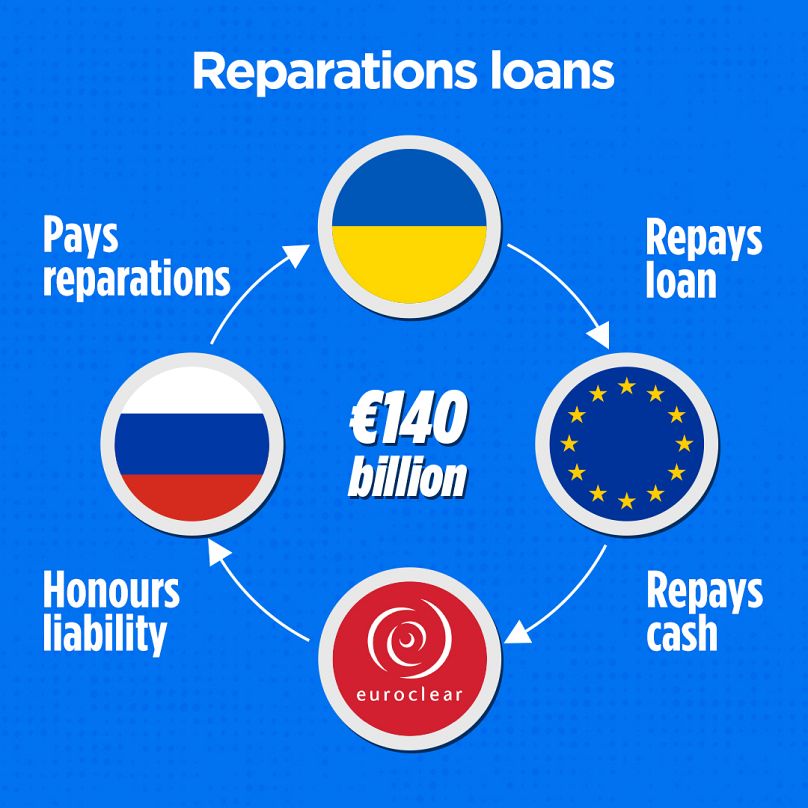Support grows for using Russian assets in €140 billion loan to Ukraine, but key questions remain

Political support is growing across the European Union for a groundbreaking plan to issue a €140 billion loan to Ukraine based on the immobilised assets of the Russian Central Bank, which would help the country sustain its economy and armed resistance.
"It's a very good idea," Finnish Prime Minister Petteri Orpo said at an informal summit of leaders on Wednesday. "I think that we have to go forward with that."
His Swedish counterpart was equally positive.
"We have long argued in favour of a more offensive way of using the frozen assets because it's simply not acceptable to have all these frozen assets and regard them as Russian equity with no chance of using them," Ulf Kristersson told reporters.
Danish Prime Minister Mette Frederiksen, who welcomed the 27 leaders in Copenhagen, called on the bloc to rapidly step up financial and military assistance to Kyiv.
Ukraine is estimated to need €60 billion between 2026 and 2027 to plug its budgetary deficit, and a similar amount to procure weapons and ammunition.
"There are some legal questions that have to be asked," Frederiksen said about the new initiative. "I'm confident that we will find a way through this. But I think the whole idea of using the frozen assets – I think it's a good idea."
The loan, as designed by the European Commission, represents the most audacious step since the money was frozen in the early days of the full-scale invasion.
Until now, the bloc had only captured the windfall profits generated by the Russian money held at Euroclear, a Brussels-based central securities depository.
The new plan, which is still in early stages, would go further and transfer the entire cash balances from Euroclear to the Commission. The Commission would then issue a €140 billion loan to Ukraine, disbursed gradually over time and subject to conditions.
Ukraine would be asked to repay the so-called "Reparation Loan" only after Russia agrees to compensate for the damages caused. Afterwards, the Commission would repay Euroclear, and Euroclear would repay Russia, completing the circle.
Given that the Kremlin is unlikely to provide reparations, the scheme could effectively amount to confiscation of sovereign assets, which is illegal under international law.
Ursula von der Leyen, who attended the summit, stressed this would not be the case.
"We are not confiscating the assets," the Commission president said.
"There's a growing consensus among us that it's not only the European taxpayers that should pay for the support to Ukraine, but that Russia has to be held accountable. Russia is the perpetrator. It has caused the damage," she went on.
"I think we have now a sound legal way to do this with the proposals of the reparations."
Question marks
So far, the Commission's plan, presented last week to member states in a two-page document, consists of broad concepts that require additional work.
The legal texts are expected by the end of the year.
Beyond the blurry line between transfer and confiscation, the executive has to clarify how the potential financial risks will be shared between the 27 member states.
If there is no consensus to use the EU budget as the ultimate guarantee, the Commission's preferred option, each participating country will have to put forward its own safeguard based on economic weight, further complicating the scheme.
Belgium, which hosts Euroclear, has voiced particular concern about the scenario of a multi-billion-euro lawsuit and negative repercussions for the economy. European Central Bank President Christine Lagarde has expressed similar worries.
"If countries see that central bank money can disappear when European politicians see fit, they might decide to withdraw their reserves from the eurozone," Belgian Prime Minister Bart De Wever said last week after German Chancellor Friederich Merz published an op-ed in favour of the €140 billion loan.
Confiscation, he said, "will never happen".
De Wever did not speak to reporters at the summit in Copenhagen.
French President Emmanuel Macron, who had previously opposed the seizure of Russian assets, described von der Leyen's blueprint as a "very good thing" that could provide Ukraine with financial predictability in the long term.
"Europe needs to remain an attractive and reliable place. That is to say, when assets are frozen, we respect international law," Macron cautioned on Wednesday. "This was also what the Belgian Prime Minister reiterated."
Voting rules are an additional headache. As of today, EU sanctions have to be renewed by unanimity every six months. This means that, in theory, any member state could veto the prolongation, unfreeze the assets and derail the entire loan, leaving the bloc liable.
As part of the plan, the Commission suggests activating Article 31.2 of the EU treaties to switch from unanimity to a qualified majority. The article, though, says that any country can oppose the switch for "vital and stated reasons of national policy".
A previous attempt to change the periodicity of sanctions renewal was blocked by Hungary, leaving the norm at six months.
Irish Taoiseach Micheál Martin admitted there would be "challenges" in making the loan a reality on the ground, but added: "Given the seriousness and severity of the situation, that's where Europe now is in terms of the next stage."
The Kremlin has already warned of retaliation should the plan proceed.
"We are talking about plans for the illegal seizure of Russian property. In Russian, we call that simply theft," spokesperson Dmitry Peskov said, adding, "the persons involved will be prosecuted in one way or another, they will all be called to account".
Yesterday


